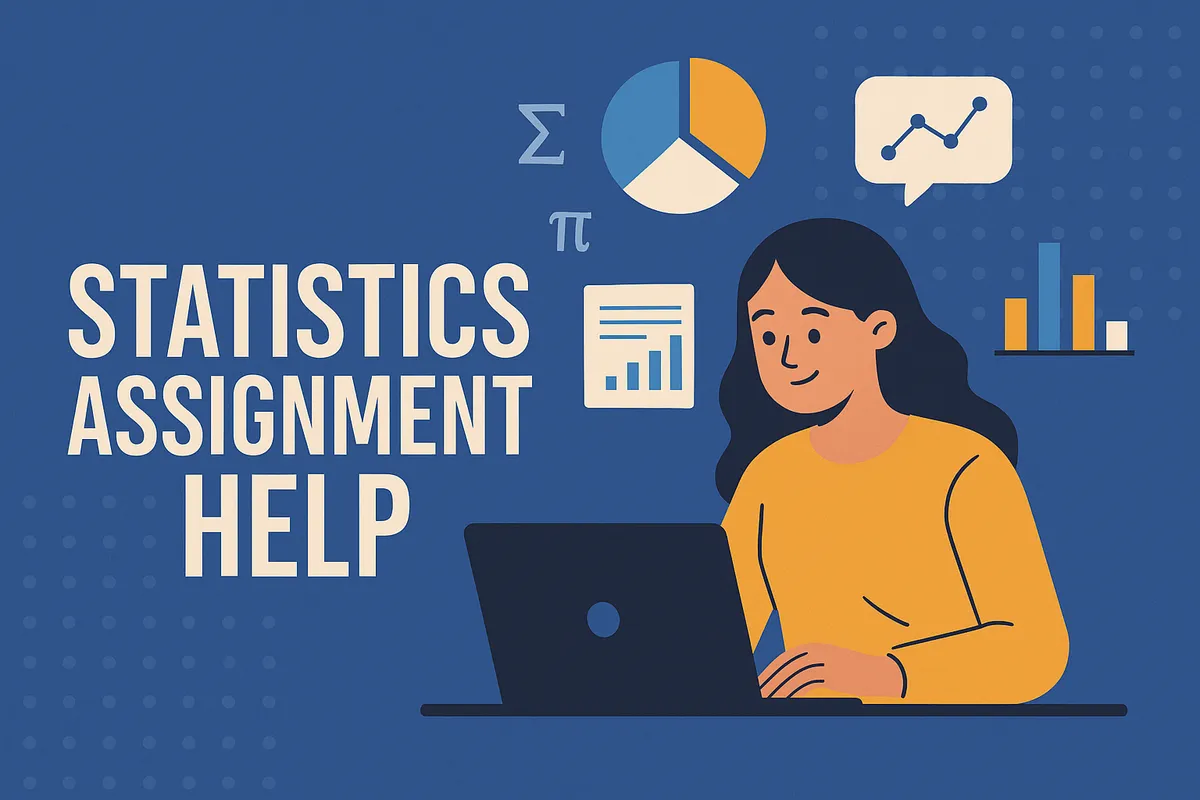Numbers Don’t Lie — But You Can Beat Them with Expert Stats Help

Hey, can I be honest? Statistics is like that annoying friend who never lets you forget your mistakes—because, well, numbers don’t lie. They stare at you coldly, with all their means, medians, and p-values, and say, “Nope, that data isn’t fooling anyone.” But here’s the kicker: while numbers don’t lie, you can beat them at their own game—if you know how to play. And if you don’t, well... that’s where statistics assignment help swoops in like a superhero in nerd glasses.
Why the Hell Are Numbers So Intimidating Anyway?
If you asked me five years ago about statistics, I’d probably say it’s a cruel joke designed to make students cry softly in libraries. (True story.)
The thing is, numbers are just facts. But when they’re wrapped in jargon—standard deviations, null hypotheses, Chi-square tests—they get intimidating.
Here’s the thing: stats isn’t just math, it’s a language. It’s the language data uses to tell a story about the world. Whether it’s predicting whether your favorite team will win or figuring out how a new medicine works, stats underpins it all.
But like any new language, if you don’t get the grammar and vocabulary, you’re gonna flounder. And that’s normal.
What Does “Beating Numbers” Even Mean?
I get this question a lot. Aren’t numbers objective? How can you “beat” them?
Well, think of it like this: numbers show the truth, sure. But to make decisions, to write reports, to ace that assignment, you’ve got to interpret those numbers correctly.
Beating numbers means:
- Understanding what the stats actually mean
- Using the right methods to analyze your data
- Explaining your findings clearly so they make sense to humans, not just computers
If you miss any of that, you’re basically letting the numbers win because you’re lost in translation.
So Why Do Students (Including Me) Need Expert Stats Help?
Look, I’m not gonna pretend stats is easy for everyone. Or even most people.
When I first started, I was drowning in formulas, confused by software like SPSS and R, and terrified of terms like “heteroscedasticity” (which sounds like a disease).
Here’s what expert stats help did for me:
- They turned gibberish into digestible explanations
- They showed me how to run analyses properly, not just copy-paste answers
- They helped me build confidence—because stats isn’t about memorizing; it’s about understanding
And the crazy part? Once I got that help, I wasn’t just passing assignments—I was actually interested. Stats became less of a monster and more of a puzzle I could solve.
What Makes Expert Stats Help Actually Work?
You might wonder—why do some tutoring or assignment help services totally nail it while others leave you more confused?
From my experience (and from chatting with other students), here’s the secret sauce:
1. They Don’t Just Give Answers. They Teach.
Nothing worse than getting a perfect answer with zero clue how they got there. The best help breaks things down step-by-step.
Like your chill friend who patiently explains what a confidence interval really means, or why a p-value less than 0.05 matters.
2. They Know Their Stuff.
Real experts don’t guess or Google last minute. They have degrees, experience, and know how to handle stats software.
This means less “uhhh…” moments and more “here’s exactly why your ANOVA test failed.”
3. They Respect Deadlines.
Stats panic hits hard and fast. The best help understands that and delivers fast—sometimes even within a few hours.
4. They Make Learning Stick.
Good help isn’t just a quick fix—it leaves you with understanding for your next exam or project.
A Quick Story: How Expert Help Saved My Sanity
One time, I had to analyze survey data for a class project—think dozens of variables, weird scales, and missing entries everywhere. I was stuck.
After hours of fumbling, I reached out to an expert service. They not only cleaned my data but explained each step, why certain tests were used, and how to interpret outputs in SPSS.
The assignment? Acing it felt less like luck and more like teamwork between me and my stats helper.
That’s what expert stats help really feels like—having a knowledgeable buddy to decode the numbers and guide you through the chaos.
Why You Shouldn’t Just Rely on Google or YouTube
Sure, YouTube tutorials and forums can be great, but stats is tricky. One wrong assumption, one misapplied test, and your whole analysis can collapse.
Plus, tutorials often don’t match your exact question or data. Real help? It’s customized to your assignment and your level.
Think of it like this: you can learn to cook by watching videos, but when you have a professional chef helping you through your first souffle, that’s a game-changer.
How to Find Expert Stats Help You Can Actually Trust
This is the million-dollar question, right?
Here’s what worked for me and others I know:
- Look for real reviews from students like you.
- Choose services that show expert credentials—not just generic freelancers.
- Make sure they provide step-by-step explanations, not just results.
- Confirm they respect deadlines and originality (no copy-paste jobs).
- Don’t hesitate to ask questions before committing—good services love transparency.
Final Thoughts: Numbers Don’t Lie, But They’re Not the Enemy
Stats can feel like a beast, but really—it’s a tool. Numbers tell a story, and you’re the storyteller.
Expert stats help doesn’t cheat you; it arms you. It helps you read, interpret, and even challenge those numbers confidently.
If you’re stuck, overwhelmed, or just wanna make sure you’re not missing anything, getting that help isn’t just smart—it’s essential.
So don’t let the numbers intimidate you. Beat them by understanding them—one expert tip at a time.